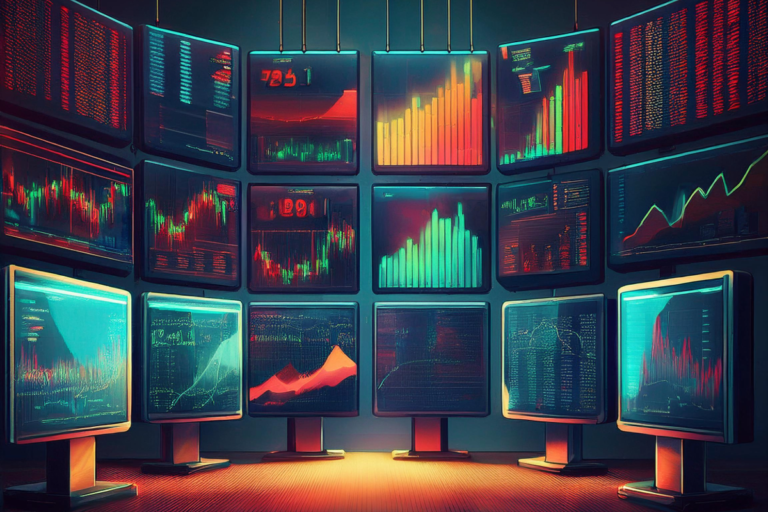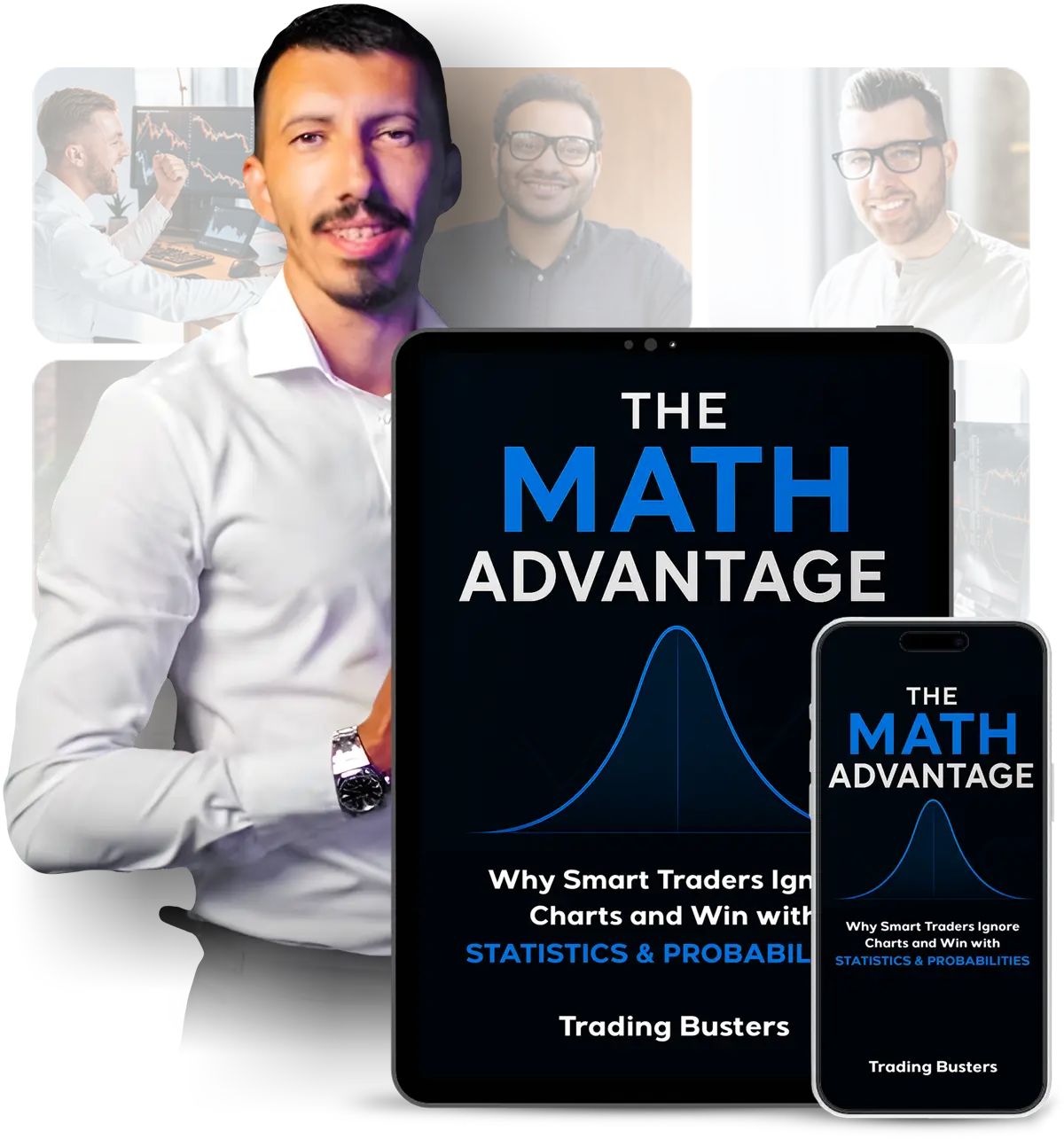If you’re reading this, you probably wondered, “What is trading?” Well, you’re in the right place. This article will explain everything you need to know if you want to start trading. Keep reading to learn exactly what trading means and how to get started.
What is Trading? A Smart Guide for Beginners

At first, trading might seem complicated, confusing, and hard to understand. But don’t worry — trading becomes much easier once you learn a few basic concepts.
Luckily, we’re about to cover these basics right now, so you can have the best possible start in trading. Let’s go!
What is Trading and How Does it Work?
First, let’s clearly define trading so you understand how it works.
Trading Definition — How Does Online Trading Happen?

Simply put, trading means buying and selling financial assets (like stocks, currencies, or crypto coins) to make a profit. A trader earns money by taking advantage of price changes in the financial markets.
For example, imagine you buy a company’s stock when the price is low, and sell it later when the price rises. The difference between the buying price and selling price is your profit.
How do these trades happen? Everything takes place online. Traders can work remotely, using their laptops, tablets, or phones. All you need is an account on a trading platform, and you can access the financial markets anytime, anywhere.
Trading vs. Long-Term Investing

The main difference between trading and long-term investing is the amount of time you hold an asset.
- Trading: You buy and sell quickly, trying to make money from short-term price changes.
- Long-term investing: You buy assets and hold onto them for a long time, usually many years. The goal is for the value of the assets to increase over time.
Practical Trading Examples on Financial Markets

To understand better how trading works, let’s look at some examples from different markets:
Forex Trading Example:
- A few days ago, you bought €1,000 at an exchange rate of $1.10 per euro.
- Today, the exchange rate rose to $1.15 per euro, so you sell your euros and get $1,150.
- Profit: You made a $50 profit.
Crypto Trading Example:
- A week ago, you bought 2 Bitcoins for $20,000 each, paying a total of $40,000.
- Today, Bitcoin’s price increased to $30,000 per coin, so you sell both for $60,000.
- Profit: You made a $20,000 profit.
Stock Market Trading Example:
- Three days ago, you bought 100 shares of Trading Busters at $500 each.
- Today, the share price rose to $550 per share, so you decide to sell.
- Profit: You made a $5,000 profit.
What Does a Trader Do and How Do They Make Decisions?

Now that you understand what trading involves, let’s move on to what traders actually do.
What Does it Mean to Be a Trader? Types of Traders and Trading Styles
Simply put, a trader buys and sells assets on financial markets, trying to make profits from short-term price changes. Their job is to watch the markets closely and choose the best moments to trade.
There are different kinds of traders based on the trading styles they use. The main types are:
Day Trader
A day trader opens and closes all trades on the same day. This avoids big price swings that happen overnight. (We have a complete guide on Day Trading if you want to learn more.)
Scalp Trader
A scalp trader makes many small trades during the day, each making small profits. They look for tiny price movements and close trades very quickly, often within seconds or minutes.
Swing Trader
Swing traders hold trades open for a few days or even weeks, trying to profit from medium-sized price movements.
Event Trader
Event traders make trades based on important events (economic, political, or other news) that could impact the markets.
Analyzing the Market — Factors That Influence Trader Decisions

Many factors affect trading decisions. The most important ones are:
- Current market conditions: Understanding what’s happening right now.
- Risk management: Protecting your money and minimizing losses.
- Trading strategy: Having a clear plan for making trades.
- Emotional state: Your feelings and mindset can greatly influence your decisions.
Let’s take a closer look at each of these!
Current Market Conditions
The current market conditions play an important role in a trader’s decisions. Traders must understand what’s happening right now in the market to adjust their strategies. This helps them handle challenges and get better results.Risk Management
Risk management means protecting the trader’s money and limiting losses. No matter how good a trading strategy is, risks will always be there. Good traders always use risk management to avoid big losses. Without it, traders can quickly lose their money.
Trading Strategy
A trading strategy gives traders clear rules to follow when trading. Having a well-defined strategy is the secret behind every successful trader. It prevents impulsive decisions and protects traders from losing money unnecessarily.
Trader’s Emotional State
A trader’s success depends greatly on their emotional state. Discipline, patience, and self-control are key to steady profits. On the other hand, emotions like fear, greed, anger, stress, or FOMO (Fear of Missing Out) often lead traders to make bad, impulsive decisions and break their trading rules.
Important Skills for Successful Trading

If you want to succeed in trading, knowing market basics and trading strategies isn’t enough. You also need these important skills:
- Discipline: Sticking to your trading strategy and avoiding impulsive decisions.
- Caution: Knowing exactly how much money you can risk and protecting your capital at all costs.
- Good Knowledge: Understanding the market and the factors that move prices.
- Patience and Self-control: Avoiding impulsive decisions and not reacting emotionally to sudden market movements, which could lead to losses.
Types of Trading and Basic Strategies

Now that you know what successful traders do, let’s look at the main types of trading and popular strategies.
Short-term vs. Long-term Trading — Pros and Cons

When choosing a trading style, consider your lifestyle, financial goals, and personal preferences.
Short-term trading means opening trades for short periods to get quick profits from small price changes. It allows you to quickly respond to market changes and gives you more control. However, it involves higher risk and can cause stress because traders must always watch the market and make quick decisions, sometimes impulsively, leading to losses.
Long-term trading means buying assets and keeping them for months or years. It’s great for traders who want stability and less stress, because they don’t need to constantly watch the markets or rush decisions. However, long-term traders usually need more money upfront and must wait longer to see significant profits.
Trading on Forex, Stocks, Crypto, and CFDs — Basics to Know

If you want to start trading, it’s important to understand the main financial markets:
- Forex Trading involves buying and selling currency pairs (like EUR/USD, GBP/JPY). Your goal is to profit from changes in currency prices.
- Stock Market Trading means buying shares (small pieces) of a company. Companies sell shares to raise money, and traders buy them to earn profits as the company grows.
- Crypto Trading involves cryptocurrencies, digital money that can be used to buy goods and services or as an investment.
- CFDs (Contracts for Difference) let traders speculate on asset prices (like stocks or currencies) without actually owning them.
Scalping, Day Trading, Swing Trading, and Investing — What Suits You Best?

A trader’s secret weapon is their trading strategy, which must match their lifestyle and personality. Here are some popular strategies:
- Scalping involves making many small trades throughout the day, each earning small profits. Ideal for traders who prefer fast and frequent trading.
- Day Trading means opening and closing trades within the same day. Good for traders who want to benefit from daily price changes.
- Swing Trading means keeping trades open for a few days or weeks. It suits traders looking for medium-sized price movements.
- Long-term Investing means holding assets for a long time, usually years. Perfect for traders looking for long-term stability who don’t want to worry about short-term price changes.
How to Start Trading — Step-by-Step Guide

Ready to start trading? Here’s how to begin:
Learn Trading — Books, Courses, and Helpful Resources
Opinions about how traders should learn are mixed. Many books and websites focus on Technical Analysis, but at Trading Busters, we don’t recommend relying heavily on it. Technical Analysis can stress traders emotionally, keep them stuck in front of charts for hours, and cause them to take big risks, often losing money.
Instead, we recommend developing a strong mindset first. Books about the psychology of money can help you have the right attitude towards trading.
A great book to start with is “The Psychology of Money” by Morgan Housel.
For trading courses, beginners can start with our free Trading Course, where you learn basic Forex trading concepts in just two and a half hours.
For extra information and support, our newsletter or free Telegram Group provides plenty of inspiration and useful information for passionate traders.
Choosing a Reliable Broker and Creating a Trading Account

Choosing a trusted broker is one of the first steps towards success in trading. A broker buys and sells assets on your behalf, acting as a middleman between you and the market. You should pick a broker that follows financial rules and provides a safe trading environment.
Next, you create a trading account. You pick a trading platform (recommended by the broker or one you prefer), fill in a form with your personal details, confirm your identity, and choose how much money you want to invest. Once you’re set, you’re ready to start trading.
Testing Strategies on a Demo Account Before Real Trading

The best advice for beginners is not to jump straight into trading with real money. Instead, practice first on a demo account. Most trading platforms offer this option, so use it to learn.
A demo account works exactly like a real account, but instead of real money, you use virtual money. This lets you safely test your strategies and learn how the market works without risking your own funds.
Trading Platforms, Tools, and Technologies

To trade well, you need to understand and choose the right platforms and tools.
Popular Online Trading Platforms
Traders choose platforms that are easy to use, safe, have advanced features, and offer access to major markets. Some popular platforms are:
- MetaTrader 5 — Very popular for Forex trading, also good for stocks, futures, and crypto.
- NinjaTrader — Used mainly for futures trading.
- eToro — Great for social trading. Traders can share ideas or copy other people’s strategies.
- Binance — Popular for crypto trading, with copy trading options and trading bots.
- Exante — Offers access to many different financial markets.
How Does Leverage Work?

Leverage allows you to control larger amounts of money with a small investment. While leverage can increase your profits, it also increases your risk. It’s important to be cautious and use risk management carefully — don’t let greed take over.
Essential Technical Indicators for Market Analysis

Traders use different technical indicators to analyze markets. Here are some common ones:
- RSI (Relative Strength Index) — Shows if an asset is overbought or oversold, and possible price reversals.
- MACD (Moving Average Convergence Divergence) — Signals changes in the direction of a price trend.
- Moving Averages — Helps identify short-term or long-term trends.
- Bollinger Bands — Measures market volatility and when prices move too much in one direction.
- Fibonacci Retracement — Identifies possible support and resistance levels based on Fibonacci numbers.
Benefits and Risks of Online Trading

Before starting, it’s important to understand both the advantages and risks of trading.
Why Are More People Trading?

Recently, trading has become popular, even among those without special education or experience. But why?
- You can trade anytime, anywhere — just need a laptop, tablet, or phone.
- Trading offers a lot of freedom — you don’t have to follow a strict schedule.
- You can make money quickly without spending years studying finance.
Risks and How to Manage Them

Before you start trading, pay attention to the risks and learn how to manage them carefully.
- Financial losses: Trading involves money, so there’s always a risk of losing it. Good risk management and a careful approach help protect your money. Avoid investing more than you can afford to lose.
- Market Volatility: This means sudden changes in prices. While volatility can help you make money, it can also cause big losses if you ignore your strategy or take unnecessary risks. Always be cautious and don’t take uncalculated risks.
Common Beginner Mistakes and How to Avoid Them

We learn from mistakes — but here are three common trading mistakes you should avoid if you want to succeed long-term:
- Impulsive Decisions: Trading is not the place for quick decisions based on emotions. Stick strictly to your strategy.
- Taking Too Much Risk: Big risks usually don’t end well. Just one huge loss can force you out of trading, so never take risks you can’t handle.
- Emotion-Based Trading: Trading and emotions don’t mix well. Many traders lose money when emotions control their decisions. Keep emotions out and rely on logical, strategic decisions.
Who Are the Participants in Trading Markets?

Here are the main players you’ll encounter or consider when trading:
- Retail Traders (like you): Individuals trading from home or personal accounts.
- Brokers: Companies helping you buy and sell on markets.
- Banks and Financial Institutions: Large entities that move big amounts of money.
- Investment Funds: Groups managing investments for people or businesses.
- Governments and Central Banks: Control policies and actions affecting markets.
Understanding these participants helps you trade smarter and anticipate market moves.
Individual Investors vs. Professional Traders

Individual investors are regular people who trade their own money. Some have a lot of experience, others don’t.
Professional traders, however, usually work for big financial institutions. They have deep financial knowledge, understand the market well, and can make smart decisions based on experience.
Role of Banks, Investment Funds, and Market Makers
Banks, investment funds, and market makers are very important in trading. They make sure the market works smoothly and stays stable.
- Banks and investment funds provide most of the money and market analysis.
- Market makers ensure that markets have enough buyers and sellers, helping to keep prices stable.
Together, these groups create a safe trading environment where traders can operate and find good opportunities.
How Economic News Impacts Financial Markets

Economic news has a big impact on the market. When major events happen, like economic crises, wars, or political decisions, prices can change very quickly.
These changes often affect traders’ decisions. For example, a sudden bad news story can make traders panic and sell quickly. On the other hand, positive news can lead traders to buy more, pushing prices higher.
Tips for a Good Start in Trading

Here are some tips that will help you start your trading journey right:
Set Realistic Goals and Manage Your Money Well

Take it slow. Don’t rush or take big risks to make money fast. Trading should be about steady growth and safe profits.
Protect your money. Don’t invest too much in just one trade. Instead, spread your money across multiple trades to reduce risk.
Discipline and a Clear Trading Plan Are Essential

Discipline is the key to trading success. Always stick to your plan and avoid making decisions based on emotions.
Stay Informed and Improve Your Strategies

Always learn new things. Read trading books, take courses, watch webinars, and follow experts on social media. The more you know, the better decisions you’ll make.
Keep updating your strategies. Good traders always adapt and improve based on changing market conditions.
FAQ — Common Questions About Trading

Here are answers to some common questions people have about trading:
How Much Money Do You Need to Start Trading Online?
Starting trading might need a significant initial investment, especially if you consider the cost of good trading courses. But this investment often pays off quickly once you learn the right skills.
You can trade either with your own money (which might require a larger investment) or use a funded account — where a company provides you money to trade. Funded accounts often require less initial investment but let you trade with larger sums, helping you earn bigger profits.
How Much Can You Earn from Trading?

It’s hard to say exactly how much you’ll earn because it depends on many things — like your experience, the amount of money you have, your strategy, and how many markets you trade in.
One important thing to remember: trading always involves some risks. That’s why it’s crucial to educate yourself as much as possible. A well-informed trader is usually a profitable trader.
Is Trading Right for Everyone?

Just like any job, trading requires certain skills like discipline, patience, and managing risks carefully. Many of these skills can be learned, but you need to be willing to put in the effort. Success won’t happen overnight.
If you’re impulsive, don’t enjoy working under pressure, or struggle to follow strict rules, trading might not be the right choice for you. But if you’re willing to learn, stay disciplined, and manage your emotions, trading can be very rewarding.


